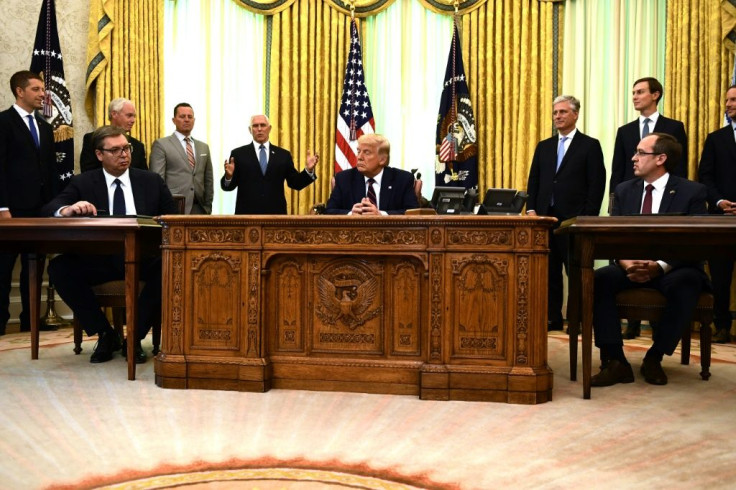Serbia, Kosovo Strike Economic Pact At White House
Former foes Kosovo and Serbia agreed Friday to normalize economic relations in a US-brokered deal that the administration of President Donald Trump touted as a major diplomatic success.
The two sides signed statement in the White House Oval Office committing to a raft of measures to improve transport infrastructure and border crossings, cut trade tariffs and share energy and water resources, and to implement earlier agreements on opening highway and rail links.
They also agreed, as part of their commitments, to improve their relations with Israel. Serbia will move its embassy from Tel Aviv to Jerusalem while Kosovo, a majority-Muslim country, will formally recognize the Jewish state.
In turn, Kosovo, which declared independence from Serbia in 2008, gained formal recognition from Israel.
"A truly historic day," Trump said, with Kosovo Prime Minister Avdullah Hoti and Serbian President Aleksandar Vucic sitting beside him in the Oval Office.
"By focusing on job creation and economic growth, the two countries were able to reach a real breakthrough on economic cooperation across a broad range of issues."
Trump praised his special emissary Richard Grenell for bringing the two sides together, two decades after they fought a war that left 13,000 dead.
"It took decades because you didn't have anybody trying to get it done," Trump said of the agreement.
"There was a lot of fighting and now there's a lot of love," he said. "Economics can bring people together."
Apparently because they do not formally recognize each other, the two sides appeared to sign parallel statements of intent rather than a formal bilateral agreement.
But a Trump administration official stressed it was a pact between the two sides.
"They have normalized their economic relations," said White House national Security Advisor Robert O'Brien.
"The Serbia-Kosovo conflict has gone on for decades. They have been stuck, unable to move forward for many, many years."
Hoti said the deal was "a big step" towards the two sides granting each other formal diplomatic recognition.
Serbia has refused to recognize its former territory since Kosovo declared independence.

Although many countries, including the United States and European powers, recognize both, Serbian allies China and Russia have withheld their endorsement of the Kosovo state, preventing it from joining the United Nations.
Vucic though said the Serbians had struck a bilateral agreement "with the US," so that no recognition was given to "third party" Kosovo.
"We will have a common market, no more surprises with the tariffs," he added.
Kosovo President Hashim Thaci hailed the agreement in a statement, praising Trump for advancing the cause "of peace, economic development and Euro-Atlantic future."
Kosovo "must now continue to work for membership in international organizations and for new recognitions, for our country to be fully consolidated domestically and internationally," he wrote.
The agreements appeared to break a freeze that came in 2018 when EU-led talks broke down after Serbia blocked Kosovo's effort to join Interpol.
That led to Kosovo slapping a heavy trade tariff on Serbian goods.
The agreements include significant help in economic and infrastructure projects from the US Export Import Bank and the International Development Finance Corp.
Hoti put the value of the US support at more than one billion euros ($1.18 billion).
"There is a clear commitment from President Trump and his administration that all these projects begin to be implemented within a year," said Hoti.
Kosovo and Serbia meanwhile agreed to suspend their bitter fight over Kosovo's international status for one year to allow the economic agreements to be implemented.
Serbia has actively pushed for some of the 100-plus countries which have recognized Kosovo to withdraw that diplomatic blessing, as Kosovo lobbies for more formal statehood endorsements.
pmh/dw
© Copyright AFP 2024. All rights reserved.




















